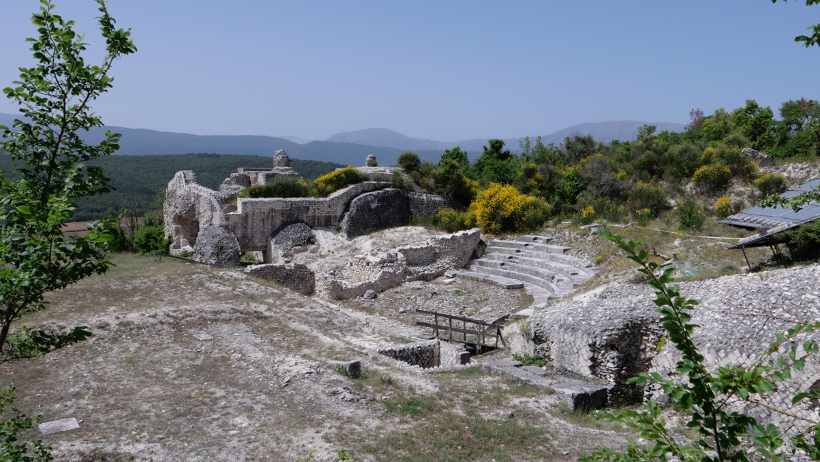In the latest instalment of our Unknown Peoples Series, Matthew McCarty (University of British Columbia) takes us through his research on the ‘Libyans’, the indigenous peoples of the Maghreb — that is, the vast territory stretching across North Africa from modern western Libya, through Tunisia and Algeria, to the Atlantic coast of Morocco, and from the northern Sahara to the Mediterranean coast.
Tag Archives: Roman Archaeology
Blog #89: Beyond Rome: The Indigenous People of Ancient Italy
In this week’s blog post, Claudia Paparella, a graduate student at the University of Toronto, takes us through her research on the Indigenous Peoples of ancient Italy through an analysis of the epigraphic and archaeological remains that they have left behind.
Blog Post #88: Graduate Student Feature with Sophia Taborski
The final instalment of our Halloween series is a grad student feature with Sophia Taborski, PhD student at Cornell, studying how curses teach us about intersecting identities, power structures, violence, and resistance in the Roman empire.
Podcast Season 3, Episode 10 – These Boots are Made for Walking: Women’s Mobility and Migration in the Roman Empire with Marie-Adeline Le Guennec
On this episode of the Peopling the Past Podcast, we are joined by Dr. Marie-Adeline Le Guennec, a professor in the hisory department at Université du Québec à Montréal, where she works on the history of Roman mobility and migration. Since 2015 she has been the co-director of Projet Hospitam, which examines hospitality in the civilizations of the Mediterranean basin. She is the author of Aubergistes et clients : l’accueil mercantile dans l’Occident romain (IIIe siècle av. J.-C. – IVe siècle apr. J.-C.) (Ecole française de Rome, 2019) and co-editor of Hospitalité et régulation de l’altérité dans l’Antiquité méditerranéenne (Ausonius, 2022).
Listen in, as Dr. Le Guennec talks about the ways in which women moved around the Roman Empire and the sources that document this movement, as well as how modern scholars examine issues of movement and mobility in the Roman world.
Podcast Season 3, Episode 9 – (Not so) Risky Business: the Potential Perils of Childbirth in Ancient Rome with Anna Bonnell Freidin
On this episode of the Peopling the Past Podcast, we are joined by Dr. Ana Bonnell Freidin, an assistant professor of history at the University of Michigan. Listen in, as Dr. Bonnell Freidin talks about risk, pregnancy, and childbirth in the ancient Roman empire, and the ways in which we might engage with notions of community care in the ancient Roman world. Content warning: this episode discusses infant and maternal death.
Podcast Season 3, Episode 8 – Not a Puella, Not Yet a Femina: Roman Girlhood with Lauren Caldwell
On this episode of the Peopling the Past Podcast, we are joined by Dr. Lauren Caldwell, who takes us through her work on puberty and girlhood and the practices that surround these life stages in the Roman Empire.
Blog Post #72: Solving the Riddle of the Sphinx with Thierry Petit
Today we continue to explore modern constructions of east and west with Thierry Petit, who discusses the origins and significance of the Sphinx in the ancient Mediterranean.
Blog Post #65: Necrophobia: Fearing the Walking Dead with Carrie L. Sulosky Weaver
This month we are featuring blogs about the undead in the classical world! This week, Carrie L. Sulosky Weaver discusses beliefs and practices concerning necrophobia (fear of the dead), and revenants (those who return from the dead) in antiquity.
Blog Post #63: Graduate Student Feature with Neal Payne
For today’s Peopling the Past blog post, we present you with another graduate feature. This time we are highlighting the work of Neal Payne, a PhD student at the University of Cambridge, whose research investigates the agricultural changes during Roman occupation of what is now modern Yorkshire, UK.
Podcast Season 3, Episode 2 – Call the (Roman) Midwife: Ancient Delivery and Childbirth with Tara Mulder
For our next episode of the Peopling the Past podcast, we are joined by Tara Mulder, an Assistant Professor at the University of British Columbia, who talks to us about what a Roman birth may have looked like, who would have been a midwife and what their role was, and how things have changed or stayed the same regarding women and pregnancy from the Roman times to current day.





